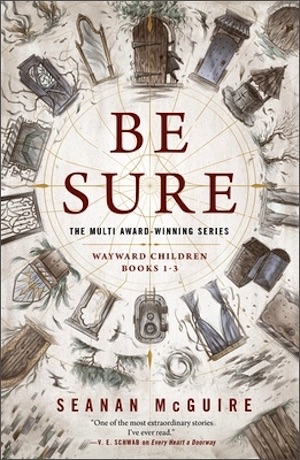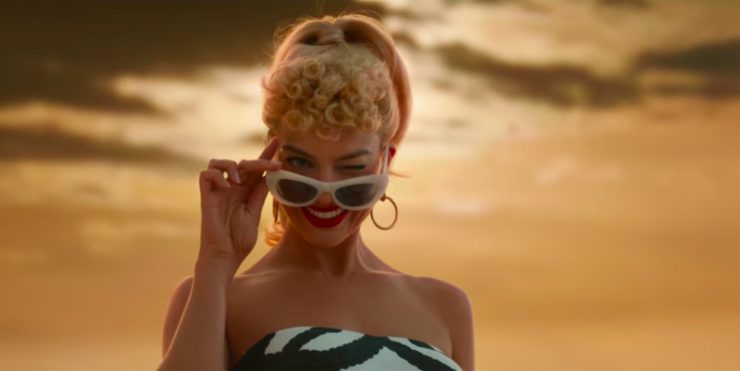It seems that we’ve been waiting a proverbial age for Greta Gerwig’s Barbie film, a movie that has intrigued the general populace for at least the last year with one driving question: What could this movie possibly be about?
Not in the sense of wanting for plot, of course, because Barbie has been a driver of story since her inception, as all dolls are—and as the film’s 2001-homaging opener attests. But what exactly is Barbie going to do in our real world… and what will that mean for all of us?
[Minor spoilers for Barbie.]
When Barbie (Margot Robbie) finds that she’s malfunctioning in Barbieland—Her feet are flat! Her waffle is burnt! Her (waterless) shower is cold! She can’t stop thinking about death!—she’s sent by her Barbie friends to see Weird Barbie (Kate McKinnon), who theorizes that the child playing with her is sad, and this sadness is leaking into the Barbie realm. The only solution is to go into the human world, find the child, and hopefully fix the problem.
Barbie doesn’t want this journey thrust upon her, but she’s doesn’t have much of a choice if she wants to continue her perfect existence as Stereotypical Barbie. So she heads for our world, not knowing that Ken (Ryan Gosling) has hitched a ride without asking, desperate to prove that he matters to Barbie more than any other Ken. Especially Ken (Simu Liu).
Buy the Book


Be Sure
What Barbie finds is a world that is in no way as enlightened as the one she occupies. What Ken finds is a Mecca of male power and importance.
At the heart of Barbie’s problems are not a child, but a grown Mattel employee named Gloria (America Ferrera), who did love Barbie growing up and is having a crisis of her own, as her daughter Sasha (Ariana Greenblatt) gets older and the world takes its usual toll. But Barbie can’t really help Gloria; instead, Gloria and Sasha take a trip to Barbieland and wind up forming a rescue crew of their own when the group find that Ken’s time in the real world has brought patriarchy to the candy-colored realm of female empowerment.
The film is even more enjoyable in its desire and attempts to be all things at once—franchise-launcher (ugh, Mattel, no), indie darling, surprise blockbuster, socio-political comedy, musical, metafiction, and so much more. Refusing to settle on any of these angles is part of what makes the film subversive and so much fun, even if it can knock you out of the story at moments. Writer-director Greta Gerwig pulls influences out of the hat like a magician, but they’re never alienating if you don’t know the source, and they elevate the film every time you spot them.
There’s a canniness to much of the humor, and explicit references that one is bound to appreciate more as a ’70s-’90s kid, which all seem like winks and nudges from Gerwig toward her contemporaries sitting in the theater, and ping just a little different when you know you’re being called out. For example, the song playing in Barbie’s car is the Indigo Girls’ 1989 classic “Closer to Fine,” yet when the Kens initiate their takeover, the song is replaced by Matchbox Twenty’s 1996 sad-guy anthem “Push.” There are a few places like that where the film all but sidles up next to specific audience members and hands them the popcorn; I felt similarly about Kate McKinnon’s casting as Weird Barbie, which, in addition to just being right, also feels like a pointed nod toward the fact that many kids who deliberately modified their Barbie dolls were some stripe of oh-so-very queer. *raises hand*
There are enjoyable Easter eggs aplenty for anyone with knowledge of Barbie’s history, from the highlighted presence of collectable wardrobe items to the appearance of the Sugar Daddy and Earring Magic Kens and Barbie’s pregnant friend, Midge. But Mattel’s influence on the film is felt loud and clear at points of omission: It’s relevant, for example, that the doll’s origin is depicted precisely as the company always describes it, neglecting the intriguing fact that Barbie’s appearance was modeled on a naughty joke gift for men, the Bild Lilli doll, which Mattel acquired the rights for in the ’60s in order to phase her out of production.
Many maligning perspectives on the movie have zeroed in on its feminist themes, which are plentiful and certainly pointed. But what’s enjoyable about Barbie is that it doesn’t pretend to have simple answers (or, indeed, any at all) to those issues, that it will resolve the problems of misogyny and millennia-worth of uneven gender dynamics with girls’ nights or cute outfits or even more powerful women in the workplace. What small solutions the film does offer are often broadcast with incredible subtlety and thoughtfulness—like the Kens coming to realize that their lives would be improved by caring for and supporting one another, instead of competing for Barbie’s attention.
But it’s funny that these points have been the primary discussion pieces (and fuel for culture wars of any kind) when the true core of the film lies in the journey of Barbie herself—a journey that is not one of feminist awakening, but of self-actualization. While Barbie’s thoughts of death seem like a one-off joke, the film’s homage to Stanley Kubrick just a fun little prod to film fans, there is something much deeper at work here. In fact, the film doesn’t just begin with a 2001 homage, it also ends on one. The possibility of evolution arises, and Barbie the movie finds itself asking the question very few films seem ready to pose of late: What if humanity is the goal, not the pitstop, or a thing to be hacked and overcome?
It’s relevant for the fact that very few films made by men seem comfortable with that idea. It’s more relevant for our current era of superhero inundation, a point in time when we seem more than happy to eschew everything that makes us ordinary, plain, and small. Barbie doesn’t think so. Barbie, both character and film, thinks we’re infinitely divine. Barbie thinks that emotion is the purpose of us, not a thing to be ashamed of, or a hindrance. Barbie wants us to experience life, not codify it.
Thoughts of death, it turns out, are not the harbinger of doom we assume them to be. And when Barbie learns the true reason she’s fixated, she takes a step far braver than any action hero of the past thirty years has managed. And I’ll wager that was always the point.
Emmet Asher-Perrin really thinks you should grab a group of friends to watch this one with because it’s such a good film for groups. You can bug them on Twitter and read more of their work here and elsewhere.










